Phil Rudd talks his AC/DC departure, Head Job and coming back from the brink
Groove master reflects on a torrid time and looks ahead to solo success
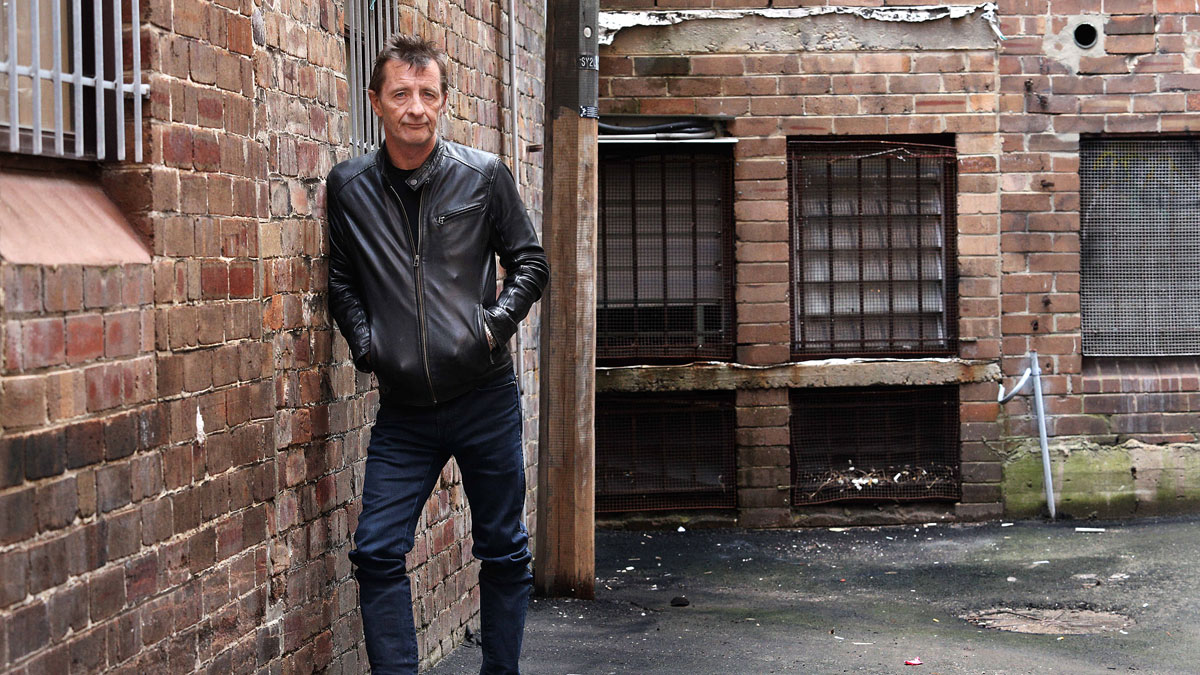
"I shot myself in the foot..."
When we last spoke to Phil Rudd in 2014 he was gearing up to promote his Head Job solo album and had a new AC/DC record and world tour to look forward to.
It would have been a fitting one last jaunt around the world’s stadiums for the man that had powered classic ‘DC albums such as Highway To Hell, Back In Black and Let There Be Rock.
That all changed in November 2014 when Rudd was arrested, and ultimately convicted, on drugs offences and making a threat to kill. He was sentenced to eight months’ home detention and, in the process, lost the place behind the AC/DC kit that he had occupied since 1975 (save for a spell away from 1983 to 1994).
It was a bitter pill to swallow, but today, as Rudd prepares to venture out on a European tour with his Head Job solo band, the 62-year-old is under no illusions over who was to blame for his legal troubles.
“I was just being a f***ing d***head,” the Aussie veteran says in typically Phil Rudd style. “I shot myself in the foot. You make your own bed, mate. You make your own mistakes and you have to deal with them and that is what I have done. Hindsight is 20/20.”
You make your own mistakes and you have to deal with them and that is what I have done. Hindsight is 20/20
Battling back from his trouble with the law was one thing, but there was a sting in the tail for Rudd. As he geared up for a run of European press interviews at the end of Summer 2016, the drummer suffered a heart attack and had to undergo emergency surgery. Again, he is surprisingly upbeat in his reflections of the near-death experience.
“I’ve never felt better,” he says. “Since they fixed me up I’ve had a whole new lease on life.”
With his future in AC/DC currently very much up in the air (the same can be said for the band itself, as at the time of writing only Angus Young remains from the Back In Black-era line-up), Rudd’s new lease of life sees him channel all of his energy into his solo band. With several mini UK tours scheduled over the coming months as part of a sprawling European jaunt, we will be seeing plenty of the straight-talking sticksman in 2017. To mark the start of this run we took the opportunity to quiz the godfather of 4/4 on legal woes, his gift for groove and AC/DC past, present and future.
You must be pleased to finally be getting out there and promoting Head Job
“Oh yeah, I’m happy with it and that’s thanks to Allan and Geoff and now we’re getting it released worldwide. The first release was just a soft release in New Zealand and Australia. The label then didn’t really do much for it. But here we go again, we’re putting it back out there and we’re happy to be doing that. We love the album, We’ve worked it and wanted to put it out for a long time. It’s stood the test of time without it ever actually getting out there!”
From purely a drumming perspective, did you approach Head Job in a different way to how you would tackle recording an AC/DC album?
“Not really. I like to just keep stoking it from behind the kit. I just keep on stoking it, I don’t f*** around. I won’t ever play something just for the sake of playing it, why would I do that?”
You’ve never been interested in flashy playing
“That is just my style. I’m not sure if it’s because I’m lazy or not. Nah, I don’t think it’s laziness. My style just is what it is and it’s pretty obvious what it is. People seem to like it. That’s a pretty good starting point.”
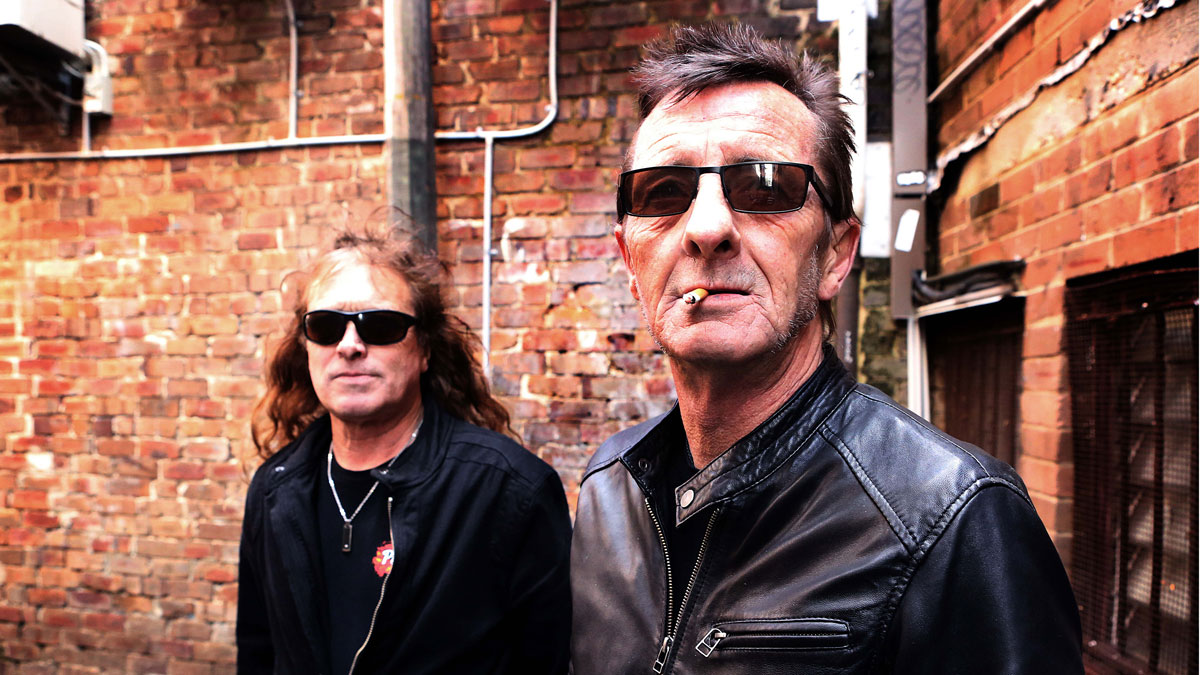
Getting Phil's gander up
The last time we spoke you said you thought you were getting better as you get older. Do you still see that as the case?
“I guess I have got older and wiser as the years have gone on. My approach is still the same, I’ve always had that same style and approach but I’m just wiser now. At the end of the day if I can’t get my gander up then I can’t play drums, you know what I mean? If I can get my gander up then I’m all good.”
During your time away from AC/DC the band has recruited some stellar drummers, but the groove of the band is never quite the same. Why is that?
“Playing with Angus and Malcolm, that’s a pretty tough gig, mate. That made me the maniac that I am today, no doubt. It’s all about what’s coming in and how you send it out. It’s all about what you’re listening to and where you put yourself. I just like to gel the whole thing together. It’s not what you play, it’s how you play it. I hit hard, I’ll always hit hard. I hit hard in the early days because if I didn’t I wouldn’t have ever been heard because I was surrounded by Marshalls. In the old days we’d have huge amps and no PA for the drum kit so I had to hit as hard as I could just to be heard. I like that, I like to hit hard, that’s my style. I like whacking it and I’ll keep on whacking it and whacking it and then I’ll whack it again.”
You’ve always played hard but with feel
“Oh it’s always about the groove and the feel. I still play that way even after 30 years or so, that shows that I was doing something right even in the early days. I’m f***ing happy that I was, mate.”
I hit hard, I’ll always hit hard. I hit hard in the early days because if I didn’t I wouldn’t have ever been heard because I was surrounded by Marshalls
You’re a big Ringo fan, was he a big influence on your style?
“Oh yeah, definitely. Ringo mate, oh man. Ringo is incredible. He’s the greatest. Simon Kirke is great as well, so is Ian Paice. All of these British drummers from the ‘60s are great. They were big influences on me. They were all innovative guys. They were doing something new every single day.”
The drum solo became a big part of rock shows in the ‘70s - were you ever tempted to throw a solo into the AC/DC show?
“Nah mate! I didn’t want to make a total p**** out of myself. The only time I’ve played a drum solo is when the PA went down when we played one time at Wembley Stadium. Everything went down, the whole thing and the only thing that anyone could hear was my acoustic kit. So everyone said, ‘Keep it going, Phil, keep it going.’ But as for solos, nah, I f*** around a little bit at home. I’m always playing something; I think it’s more just like a form of ADHD, to be honest [laughs]. I’ve got all sorts of toys that I play with at home. But when it gets time to work I’ll strip the kit right down to what I always use. That’s all that I need and I know that it all works.”
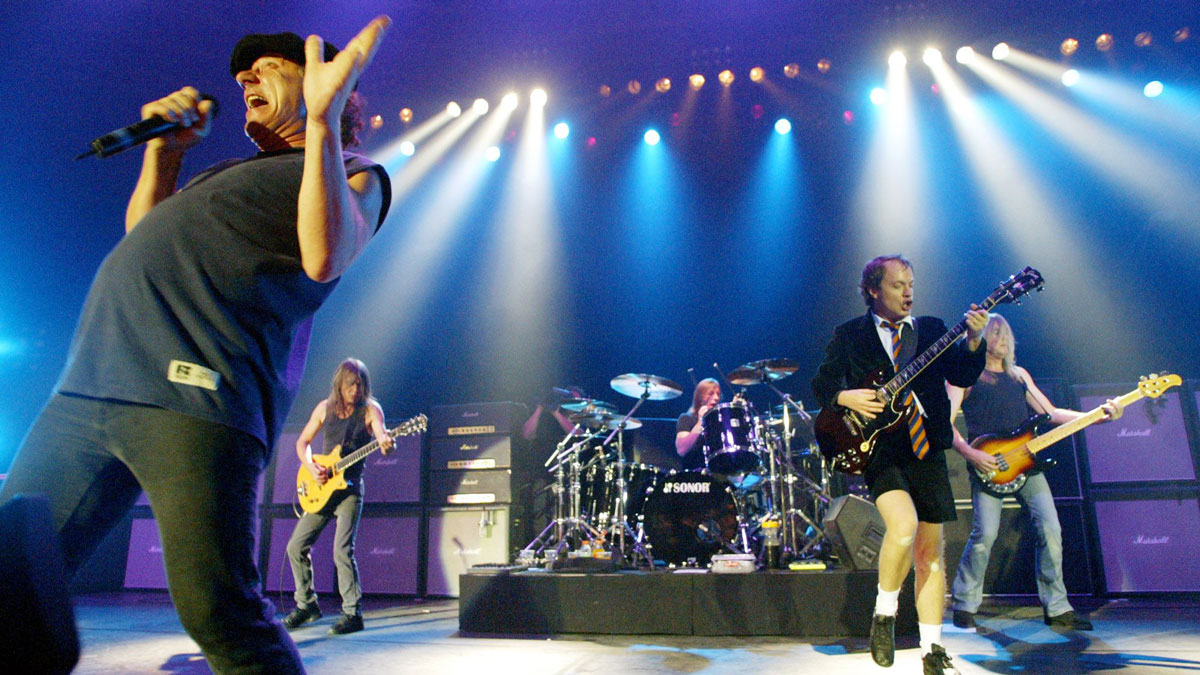
Powering a locomotive
You have a long association with Sonor, but have you changed your set-up much over the years?
“Nah, it has stayed exactly the same. It’s just one tom on top and two floor toms. Then I’ve got the big 24” bass drum that sounds like a cannon. That’s all I need. I could probably lose one of the floor toms as well!”
How did first joining AC/DC come about?
“I’d made a p**** of myself somewhere else and I’d got myself kicked out of another band. One of the guys from that band told me to check out AC/DC and he told me about the gig. I didn’t know anything about them needing a drummer. He told me to go round there and see them, so I did. An hour later I had the gig and there we are.”
It worked right from the off?
“It did, yeah. Me and the boys got on, me and the boys from my solo band get on as well. That’s really important. I think this band is a bit more relaxed than it was with AC/DC. Both bands play with a hell of a swing, it’s nice to be relaxed and to play with that swing.”
When [Bon Scott] got going we sounded like a f***ing locomotive, mate, y’know? He was always coming in at the wrong place or f***in’ turning up late, but when he was out there with us it really f***in’ ripped
At that point the band was fronted by Bon Scott, an incredible singer who was also a handy drummer
“Yeah, he had been the drummer in a band before joining AC/DC. He was great, Bon was a great bloke. He was a typical lead singer, he was always late but he was a real presence. He was a very interesting person. He was this big character, very friendly but also a very deep guy as well.”
As far as frontmen go, he was one of the greatest, wasn’t he?
“Oh yeah, that’s right. When he got going we sounded like a f***ing locomotive, mate, y’know? He was always coming in at the wrong place or f***in’ turning up late, but when he was out there with us it really f***in’ ripped. There’s a picture that we had taken outside of the front of the Hammersmith Odeon the night that we played there. We had a photo taken of the billboard outside the venue with our name up there and all of the people queuing to get in. You look at the photo and there’s Bon just walking around outside while we’re waiting in the venue to go on stage! He was a character, mate.”
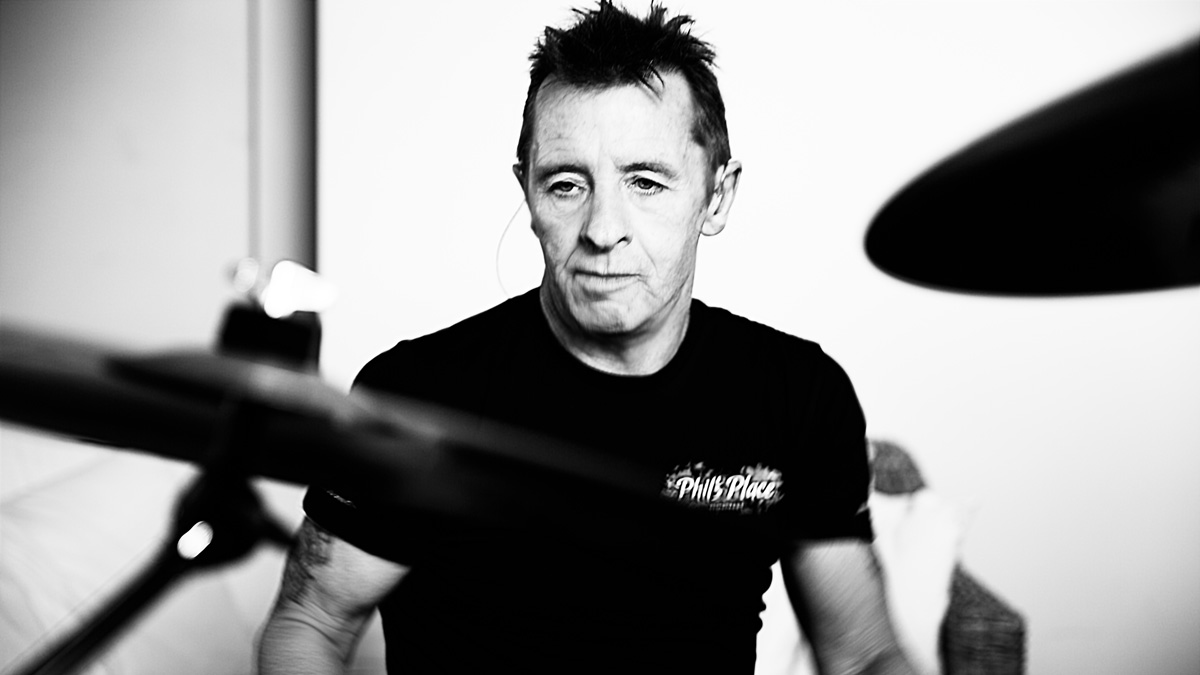
Setting off on the highway to hell...
Before long you were recording classic albums like Let There Be Rock. The album’s title track is a classic Phil Rudd beat, isn’t it? It sounds simple, but it’s very difficult to play it with the correct groove
“If you think it’s easy you start playing it! It’s good to play stuff that’s hard to play. If it sounds like it’s easy to play then you’re not playing the right thing and you should play something else. You can’t just f***in’ play, with that song you’re always working thanks to those railroad tracks of guitar strings that Malcolm used to use. I set up a couple of guitars with strings that size while we were recording the new album, no one could f***in’ play them! Malcolm played those guitars every single night. You can’t make things easy for yourself, you have to keep on working and that keeps you real.”
Let There Be Rock is a song that misses the Phil Rudd feel whenever it is played by anyone else
“I guess it does. It’s hard work to play that one, especially live. We would always play that towards the end of the show. So by the time that one came around I’d already have had an hour and a half of slogging my guts out. You’d think, ’What shall we do now, something easy? Nah, let’s do something f***in’ harder!’ That’s all good character building stuff though.”
The band’s big breakthrough came when working with Mutt Lange on Highway To Hell. Did Mutt get the best out of the band?
“Oh that album was great, mate. It was fantastic to work with Mutt Lange. He was like a white Michael Jackson. He was a really happening guy and I enjoyed working with him.”
...on songs like Back In Black, I wasn’t hearing that they would be big songs and big productions when I was recording them. I was just playing along to them as I would to any song...
Those Mutt Lange albums were huge productions with big kit sounds. Was the process of recording those albums markedly different to working on the earlier albums?
“They turned out to be big albums, but on songs like Back In Black, I wasn’t hearing that they would be big songs and big productions when I was recording them. I was just playing along to them as I would to any song, I wasn’t thinking about getting a huge kit sound, I was just playing the song. To be honest, I really like the drum sound on the Head Job album, that’s a great sound.”
Highway To Hell was a huge album, but then Bon tragically passed away. Was there any thought that the end would end at that point?
“We’d spent so many years building the band and all of a sudden we had this momentum and then Bon passed away. We took a while to mull it over and we thought about what Bon would want us to do and he would have wanted us to keep the band going because we’d worked so hard together. Then we came across Brian [Johnson], f*** me he was a unit, a great singer. It was great to find Brian. I was really sorry and sad to lose Bon but unfortunately that’s life.”
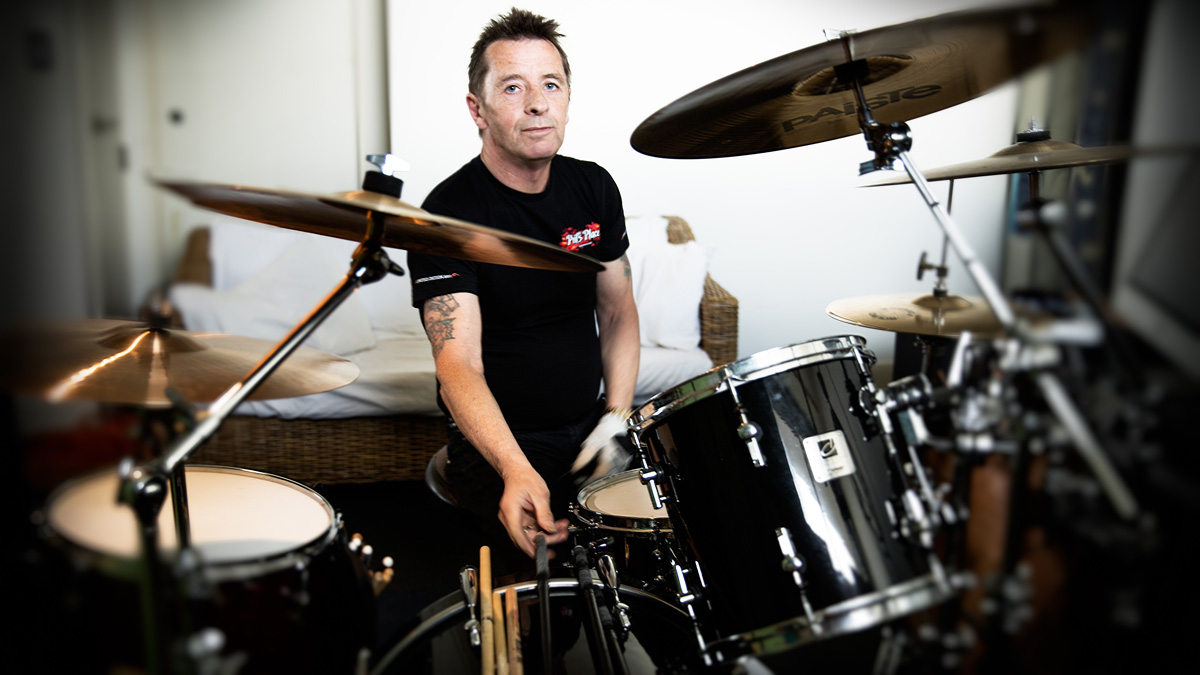
Goin' solo
If Highway To Hell was a huge album then Back In Black was a career-defining monster of a record
“That’s right, who could have ever seen that coming? A song like Back In Black was a little different drum-wise to what I had been doing. It had a little more of a set feel, it turned out great. These songs and albums just happened. There wasn’t a big process that I can talk about because we just got in there, got them down and that was it.”
You left AC/DC after recording Flick Of The Switch in 1983. Why was that?
“Oh man, everyone needs a break every now and then. You do get a break between tours but AC/DC tours are f***in’ long, mate. Look at the Black Ice tour, that one started in 2008 and finished in 2010, most people would be almost dead after that. After that sort of run you can get a bit stale. Me leaving the band the first time though in ’83, that was just me and my state of mind at the time.”
The band hit a lull in their career through the mid-to-late ‘80s, but you returned in the mid ‘90s and saw the band return to their previous heights – starting with the Ballbreaker album
“It was great to get back into the band and to get to the level that we got to. The band was always sort of pretty well locked in. We were one unit standing against whoever or whatever else came into the equation. I came back into the band and that hadn’t changed. Rick Rubin produced [Ballbreaker], now there’s an interesting sort of a guy. I can’t really say much more than that about working with him. I really enjoyed working with Brendan O’ Brien and Mutt and George Young and Harry Vanda when we worked with those guys.”
Way back in England in the late ‘70s we tried using a click in the studio and we just couldn’t. It just didn’t sound right, it didn’t sound right for the band
You worked with Brendan O’Brien on Black Ice and Rock Or Bust. He seemed to get the best out of yourself and the band
“Brendan was great to work with. I enjoyed that but then I also enjoyed the Head Job album where we recorded it all ourselves and I engineered it. It really was a suck it and see approach with this album. We just went with what we thought sounded good and hopefully other people will like it as well. It’s all a homegrown job.”
When working on Head Job were you able to use tips and tricks you have picked up from the producers you’ve worked with throughout your career?
“Not really. I’m a do it yourself kind of guy. I’m not someone that reads the manual. I do it the way that I want to do it, not the way that someone else says you should do it, y’know what I mean? That’s the approach I took with the Head Job album.”
Did you use a click on Head Job?
“Nah, no click, mate. It was just pure determination. I thought the timing on the album was pretty good, especially considering that there’s not a click on there.”
You’ve always been known for your timing
“Oh yeah. Way back in England in the late ‘70s we tried using a click in the studio and we just couldn’t. It just didn’t sound right, it didn’t sound right for the band. On some occasions we did use a click, but I won’t tell you which songs we used one on [laughs]. That worked for us as well though, I quite enjoyed it. Using a click made life f***in’ easy. It took a whole lot of pressure away from you. Either way though it’s all good as far as I’m concerned.”
You’re hitting club-sized venues on the Head Job tour, will that be a trip down memory lane to the early AC/DC shows?
“The technology has come on so much since those early days that I don’t think I’ll have to hit as hard to be heard as I did back then because we’ll have a working PA! Obviously it won’t be as big as the AC/DC rigs, on the Black Ice that rig was the biggest that had ever rolled out on the road.”
Speaking of rigs, given that you had all of those cannons and giant stage props, you must have had some onstage nightmares with AC/DC
“Oh we had nightmares all the time with the cannons not going off. But apart from that nothing ever seemed to go wrong, even after all those years.”
Rich is a teacher, one time Rhythm staff writer and experienced freelance journalist who has interviewed countless revered musicians, engineers, producers and stars for the our world-leading music making portfolio, including such titles as Rhythm, Total Guitar, Guitarist, Guitar World, and MusicRadar. His victims include such luminaries as Ice T, Mark Guilani and Jamie Oliver (the drumming one).
